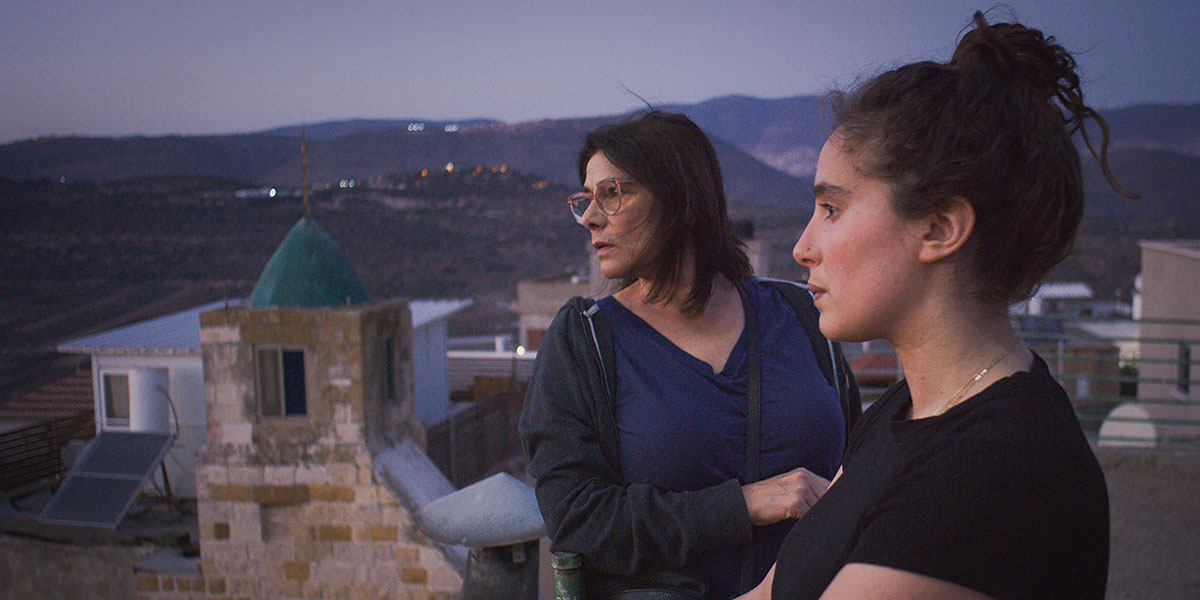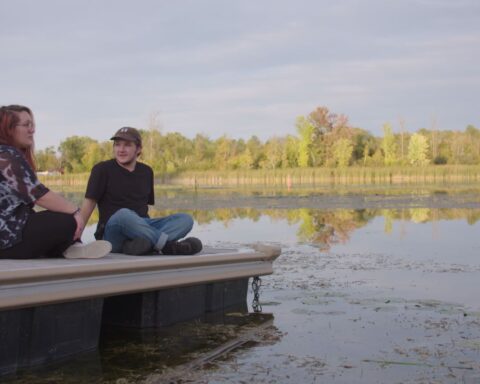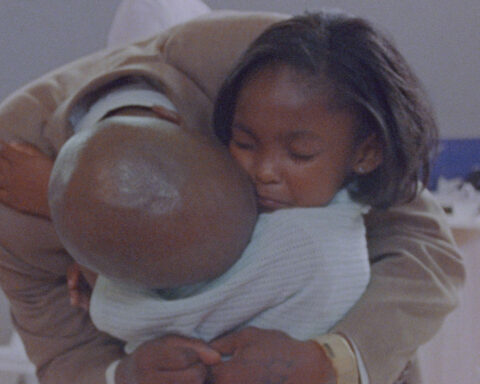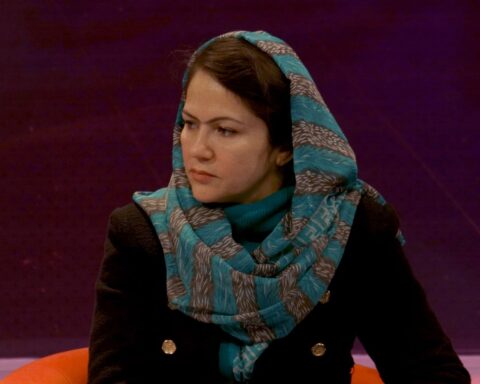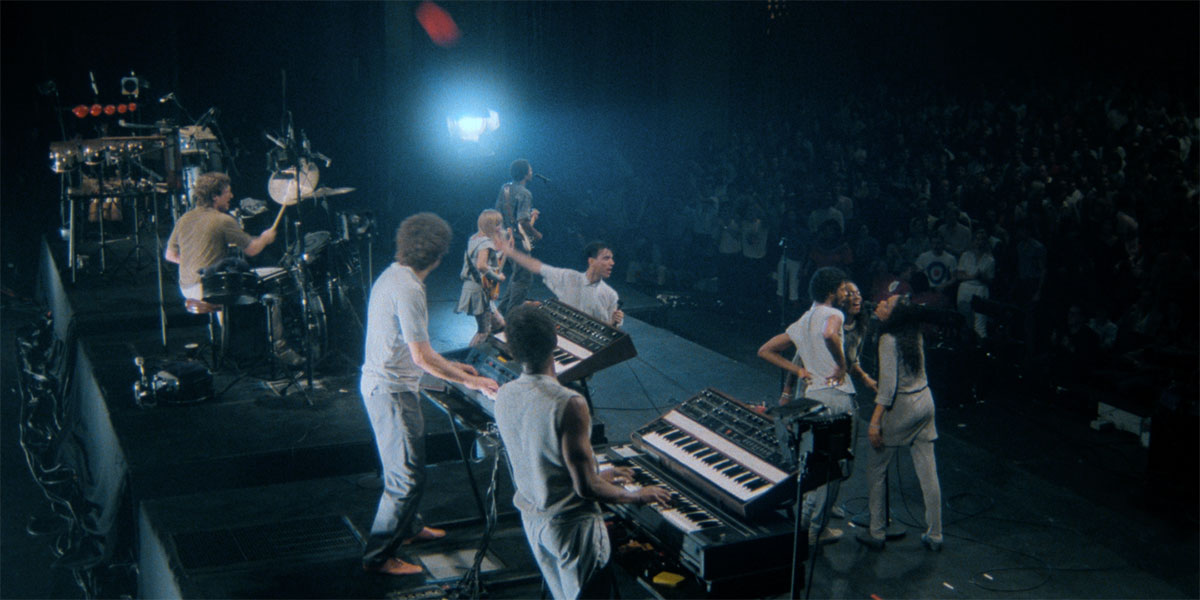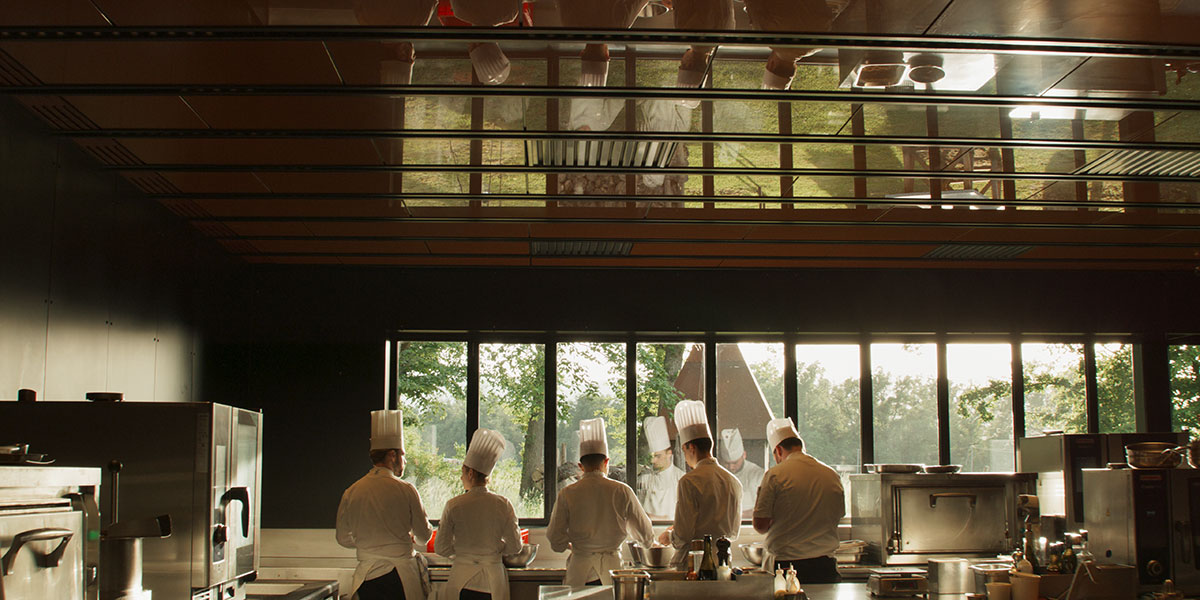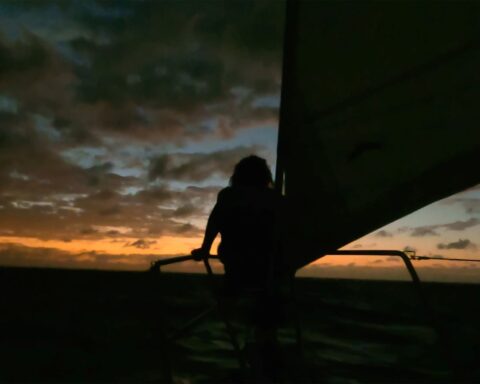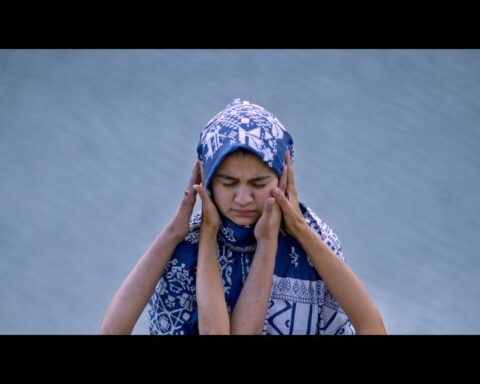“What are you after, Lina?” actress Hiam Abbass asks her daughter, Lina Soualem, during an emotional scene in Bye Bye Tiberias. Soualem tasks her mother with revisiting a painful memory in which she told her father about her plans to marry. Abbass, the acclaimed star of series like HBO’s Succession, and films like Blade Runner 2049 (2017), The Visitor (2008), and The Syrian Bride (2004), looks the past head-on in this creative interrogation of family and memory. Re-enacting the tense moment from her past, on the stage of El-Hakawati Theatre where she got her start as an actor, Abbass processes a lifetime of emotions that she’s carried after leaving her native Palestine for Paris. Soualem later says in voiceover that a favourite mantra of her mother’s is, “Don’t open the gate to past sorrows.” But Bye Bye Tiberias is a shared exercise in opening the gate and sowing the gardens of the past so that future generations may grow.
The film chronicles the many journeys that Soualem, who was born in Paris, made to Abbass’s hometown of Deir Hanna. Soualem presents diaries to her mother and asks her to read them, while interviews both formal and informal invite her to reflect upon the fragmentation of a family in occupied territory.
Inviting Abbass and her sisters to tackle the family story, Bye Bye Tiberias explores the role of collective memory in the transmission of one’s heritage. The sisters laugh and look back at their late mother and father, who appear in the many family videos that Soualem peppers through the film. The stories of the sisters’ resilience, as well as that of Abbass’s mother and grandmother, echo throughout the anecdotes and archives. Soualem often finds herself returning to images of the Sea of Galilee where family vacations brought them even though her grandparents were expelled from Tiberias in 1948. No matter where history, politics, or career ambitions may scatter the family, though, Abbass can always find her compass in Deir Hanna. She knows which way is Jordan and which way is Lebanon, and which family members are dispersed between those borders. Soualem explores her mother’s nomadic wisdom, retracing journeys and finding herself in the footsteps of the women who came before her.
POV spoke with Abbass and Soualem at the Toronto International Film Festival where Bye Bye Tiberias had its North American premiere.
POV: Pat Mullen
LA: Lina Soualem
HA: Hiam Abbass
This interview has been edited for brevity and clarity.
POV: At what point in your journeys back and forth to Palestine, Lina, did you decide to make Bye Bye Tiberias?
LS: It’s kind of a continuation of my first film, Their Algeria, in which I filmed my paternal Algerian grandparents and their story of exile from Algeria to France. Once I finished that film and was touring with it at festivals, people asked me if I was ever going to film the Palestinian side of my family. I used to say that I wouldn’t because it’s too intense, and I’m not sure I had the courage to do it. But little by little, it entered my mind and that’s when I decided to tackle it.
POV: Hiam, how was it playing yourself as opposed to a character?
HA: I don’t know if I’m playing myself. “Playing,” for me, is putting on a whole act with costume and makeup. This, for me, wasn’t an easy task. It’s not easy to dig into your personal life on camera, but it was Lina and we talked about it for a long while. I resisted many times because I felt like I am going into things that I always protected as mine and not for the audience, who knows me in characters. But I understood the importance, as Lina said, of this continuity in her questioning the history on both sides of her family. My family history is as rich, if not more rich, than the first story in the sense that this feminine side of the family tells the story of women who survived so many difficulties and traumas.
POV: Lina, what inspired the feminist perspective for the film involving your aunts as well as your mother?
LS: It was not a conscious feminist move. There are just so many women in the family. When I was kid, I was surrounded by all these women and was fascinated by their stories. Despite displacement, despite the wars, despite the traditions and the societies in which they lived, they’ve been able to influence the world around them. They transmitted so many things to my mother and she transmitted them to me. As a woman now, and not their child or their grandchild, I wanted to connect with them on an equal level and embrace their strength, their complexities, their contradictions, and their flaws and be true to them.
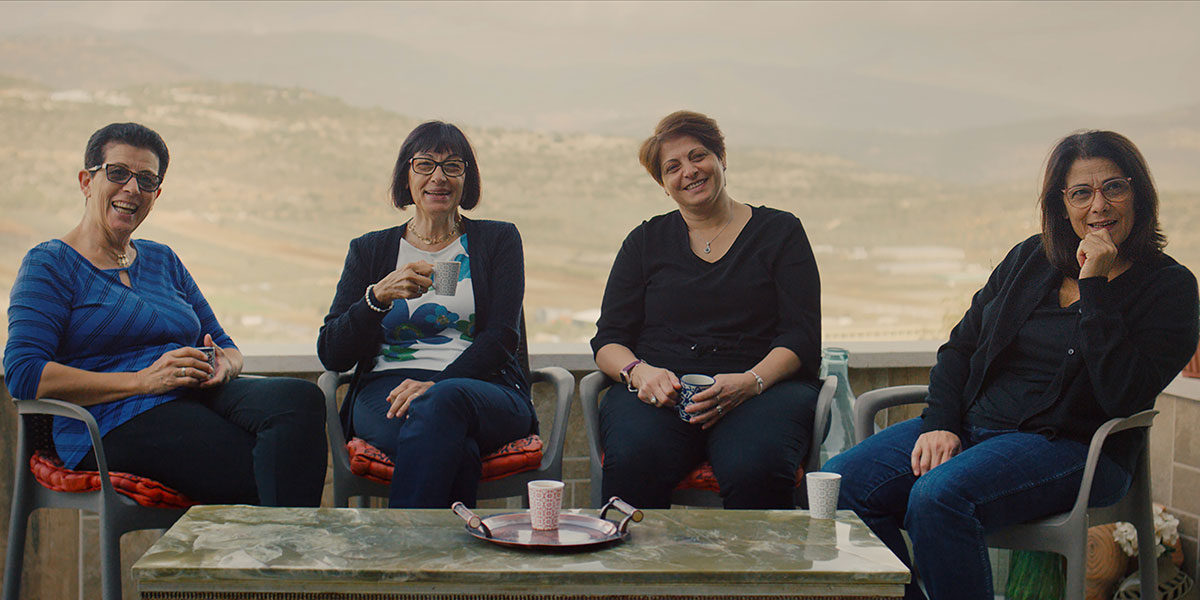
POV: Did you ever consider involving your sister, Mouna, in the film?
LS: Yes, I tried to film her in the beginning. I had some scenes that I loved with her, but it didn’t quite work in terms of narrative because I didn’t want to do a film about my family. It’s a movie about transmission and four generations of women. Having my sister made it a bit more of a family film, but I have projects for my sister in the future
HA: And she came. She was present.
LS: She helped me film in the first shoot. She was always around helping me.
POV: Hiam, you’ve directed Lina before in the film Inheritance (2012). What did you both learn about directing each other on different projects?
HA: It’s two different things: directing a documentary and directing a part. When I directed Lina, it’s a part that I wrote for her and for Mouna. I saw them as two sisters with dynamics that inspired me. They were non-actresses at that time and I directed them not as their mom, but [seeing them as] the characters I’ve written. I don’t think even then I had the feeling that I was directing my daughters. I needed distance from them in order to put them in the movie and direct them.
Lina directing me is not the same. She wasn’t directing me as you direct someone in a [dramatic] feature. She had her idea about where she was taking the story, so she was asking me to answer questions that were relevant to what she was going to say in her documentary about female heritage.
POV: Lina, how was it being in charge of your mom for a shoot?
LS: It wasn’t easy to film her in the beginning because I saw that she not at ease. At the same time, I knew what I wanted, so I was trying to be patient and feel at ease because the fact that she wasn’t at ease made me feel not at ease. It took a long time for me to be able to place the camera and feel comfortable asking some questions. I tried to use the fact that she’s an actress to put her at ease. For example, I tried asking her to react or to meet with her sisters so that there’s more life to it. It wasn’t easy to ask these questions, but it took time to find the proper language.
POV: As a portrait of collective memory, were there times when you would be discussing things from the past and family members had differing memories? How did you reconcile what happened if things didn’t align in the way people were telling stories?
LS: I wasn’t looking to have one story. The mix of the intimate memories constitutes the collective story. The more we have, the more the collective story is enriched. It was more about trying to grasp the feeling each person had in a moment, rather than having the right facts. What was important was to understand what my great-grandmother felt through her displacement, what my grandmother felt when she was displaced and couldn’t continue her studies, and what my mother felt when she knew she wanted to have a career that wasn’t really accepted.
I’m not trying to look for the truth, I’m trying to give back to them complexity. In cinema, sometimes you have images of women who are either very traditional or very rebellious, especially in the Arab region. I wanted them to cohabitate because no one is just very traditional or just very rebellious. A mix of things always constitutes us.

POV: Hiam, at what point in your career did your family understood how much you made it as an actor?
HA: For my family, there was not really a specific one. It was just the fact that they were speaking about me in the media and the press. My parents suddenly started getting the hint. But some movies were hard for members of my family to watch because of their subject or the way certain scenes made them feel. My mom and my dad, as Lina says in the film, they didn’t see much of my work because they didn’t have the opportunity. But there was one movie that I brought my mom and dad to see, and it was a turning point that helped them understand what I’m doing. It was The Syrian Bride (2004), and I think that movie influenced them a lot
They liked the subject of it. It was the first time that I sat in a theatre with my mom and dad and other members of my family to watch a movie together that I’m in. I think it was harder for me than it was for them!
POV: There’s a great scene in Bye Bye Tiberias where you’re at the El-Hakawati Theatre, the Palestinian National Theatre, and Hiam re-enacts her discussion with her father about her plans to marry. It’s so emotional, so how was that experience particularly?
HA: Very emotional. That part happened when I was living and working in that theatre, so the elements and the composition of that shooting day meant a lot to me. It was bringing me back to the period, at the place I was working in and back to that struggle I had to go through 30 years or 35 years ago. It was very emotional to go back to that theatre and do that scene.
LS: It was not an easy scene to shoot. We improvised a lot. I didn’t plan to have other people on stage with my mother. I just wanted her to act something from her life, but as it was so difficult, I started trying to look for other ways to make it easier. I asked the director of the theatre, who was also an actor, to come on stage. I had no idea what it would be like, and there was so much emotion. I asked my aunt who was with us that day to come on stage, so it was a lot of improvisation and trying to find the best way to tell a moment that was emotional and difficult.
HA: But to show you how smart Lina is, my sister was there—she lived in Jerusalem at that time, and if there was someone that I could go cry to or speak to, or get angry with, it would be her. The director of the theatre was part of my theatre troupe at that time, the group at El-Hakawati. Amir was part of the group and it was really incredible that Lina brought me back to that place with this person I was acting with and the sister that I was experiencing these emotions with. All the composites bring you back to the moment to let you speak about it.
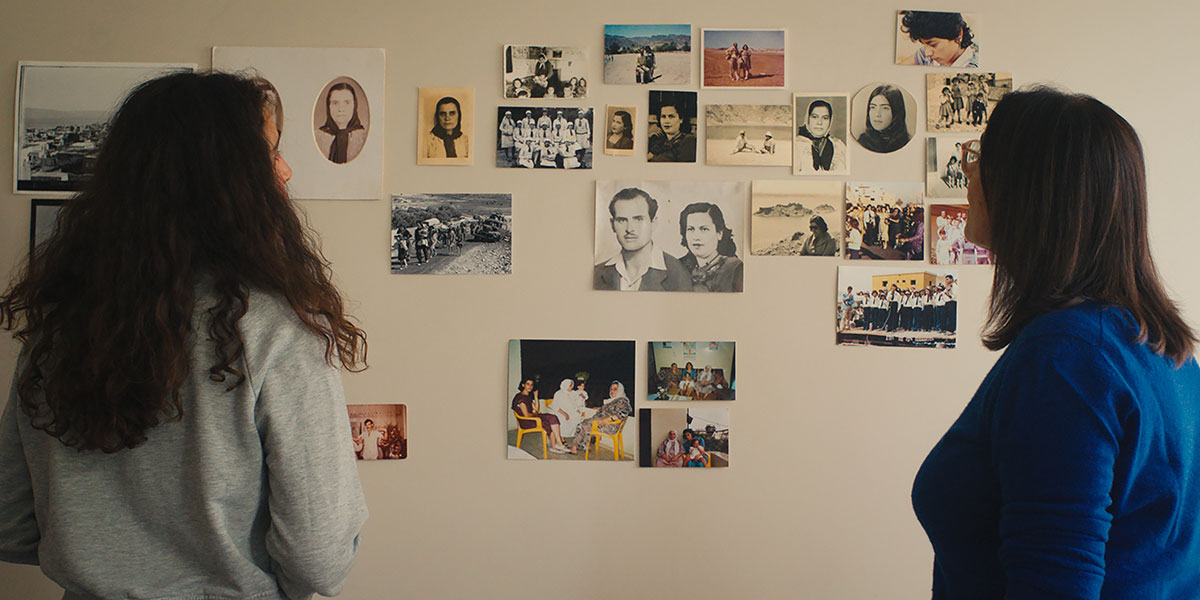
POV: In a traditional documentary sense, there’s an attitude that directors need to be detached from subjects, but why do you think the personal connection between helped get to the heart of the story here?
LS: For me, it’s necessary because I’m telling a very personal story. Ethically, it would be harder for me to film people I have no relationship with at all when I get into so much intimacy. I wouldn’t dare talk about other people’s stories or intimacies. I don’t feel comfortable doing that yet. Maybe I’ll do it in the future, but the responsibility you have when you tell the realities of other people is huge because it will affect their lives.
But, of course, the responsibility is still there. I can be more attentive to their fears or needs. They will always be around and I will always be around them. The problem, sometimes, when you film people for a doc is that you come and shoot, then you are not part of their lives anymore. It’s my family, so I don’t have this question in mind. At the same time, everything gets mixed: your job and family life.
POV: How has making this film together shaped your idea of what you call home?
LS: I was born abroad, so it’s more difficult for me to say, “This is home, that is home.” Through my films, I find that we don’t belong only to a place, but we belong to the memory of a place. If a place disappears or if you cannot access it anymore, at least you’ll be present in the memory. This is vital for me because my family comes from places that have been transformed geographically with frontiers, transformed politically, and it’s the same on my father’s side—my grandparents were born in Algeria and Algeria was colonised by the French. The Algeria that they knew doesn’t exist anymore. I never knew the Algeria that they knew, so how do you connect to places that are transforming?
It goes beyond my experience as a daughter of immigrants because nowadays everyone is facing that. There are more and more refugees, more and more people who have to flee their homes or are expelled. More people will have to find ways to their core, their identity, with the sad reality that they sometimes they cannot go back, or if you go back, you don’t belong anymore, you don’t recognise it anymore. It was vital to find things that give me a place in the world. If not, I navigate, but without having an anchor.
HA: For a long time, I was wondering what “home” was supposed to mean. I was born at home and I grew up at home, but I grew up with a home that was really like a moving sand dune. It can swallow you or it gets swallowed by whoever. I developed the notion of home being this home that I carried with me in my heart, in my memory. I travel around with it. Home, for me, is whatever I make of it in my emotional system, so it is Palestine because that is where I came from and where I grew up. Palestine is a strong part of my identity and is the luggage that I carry around with me, but home can sometimes be a shooting set or it can become a place I’m living in a moment. It can become Paris, it can become the U.S., for that time being. But it’s really a nomad notion that I carry around with me.




